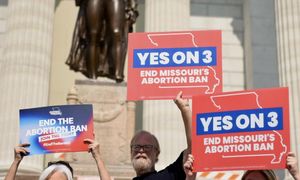On Election Day, November 5, 2024, voters across the United States faced unprecedented disruptions due to bomb threats targeting polling locations. These threats, primarily believed to stem from Russian email domains, momentarily halted voting processes and raised concerns about election integrity just hours before citizens were to cast their votes for the highest offices in the country.
Multiple reports indicated at least fifty polling places across five battleground states—Georgia, Pennsylvania, Arizona, Wisconsin, and Michigan—received these intimidating threats. The FBI announced it was monitoring the situation and confirmed the originating email addresses appeared to be linked to Russian sources. The agency stated, "None of the threats have been determined to be credible." Nonetheless, the mere presence of such threats undoubtedly instilled fear among voters, many of whom were already anxious during this particularly charged election season.
Georgia took the brunt of these threats, with Fulton County reporting over thirty instances, including multiple bomb threats made directly to local polling places. Officials acted swiftly, ensuring security measures were put in place as election workers evacuated certain sites. Some polling places were even ordered to remain open longer to accommodate voters who were evacuated, receiving positive feedback from those who had to wait outside. A poll worker characterized the situation: "The majority of those evacuated came back in and voted after having waited in the parking lot. That was a good thing." This adaptability by election officials played a key role in maintaining public confidence.
Arizona wasn't left unscathed either; Secretary of State Adrian Fontes confirmed four bomb threats received by polling locations in Navajo County. Like Georgia, the threats were quickly labeled as non-credible. Fontes noted, "The motive appears to be to ensue chaos—not to impact any political outcome. We're not seeing anything indicating this is to affect the results of the election." This reflects what many officials were trying to convey—that the chaos caused by such threats was the true goal, rather than altering the electoral outcome.
Philadelphia also faced its share of unfounded threats. Local officials received multiple calls outlining bomb threats to several election locations. Philadelphia District Attorney Larry Krasner emphasized the importance of maintaining order and assured citizens there was no need for panic, reiterATING findings from the FBI about the non-credible nature of the threats.
The atmosphere surrounding this election was already tense, with former President Donald Trump recently repeating claims of widespread election fraud, setting the stage for discomfort among voters. Trump's influence on the electoral narrative,—combined with the sense of intimidation from bomb threats—could have potentially had significant psychological effects on voter turnout.
Despite the disruptions, law enforcement officials and election monitors across the country felt prepared, having received extensive training over the past few years to handle such volatile situations. Lawrence Norden, vice president of the elections program at the Brennan Center for Justice, stated, "Election officials and law enforcement have been planning for possible scenarios like this for the last couple of years, and their training has really shown. But I think the number of these bomb threats is, if not surprising, very concerning. The threats need to be investigated, and whoever is responsible must be held accountable." Staying ready for such emergencies was beneficial, allowing many voters to proceed with their civil duties without extensive delays.
Simultaneously, the Russian government issued stern denials, declaring the accusations of involvement as "vicious slander" and typical of what they termed Western conspiracy theories. Russian officials claimed any accusations against them were baseless, stirring speculation about whether these denials could soothe concerns or feed more anxieties globally about election interference. Reports have suggested previous instances of similar tactics employed by Russian entities in other nations as they attempt to undermine democracies.
Despite the chaotic scene, voting for the most part proceeded smoothly, illustrating resilience among voters who were intent on participating. Several states had already begun processing mail-in ballots, stimulated by high turnout. Authorities remained optimistic about result availability, expected later Tuesday evening or early Wednesday.
Yet, across the five states involved, one thing became evident: the integrity of not only the election process but the very essence of democratic engagement was being tested. With foreign interference now looming as both real and imagined, American voters anxiously awaited the election’s outcome.
While the final ballot counts would determine the winning candidates, the key takeaway from this election day was the robustness of the American electoral process—resilient against intimidation, inspired by the democratic will of millions, even amid threats perceived as aiming to cause chaos.



